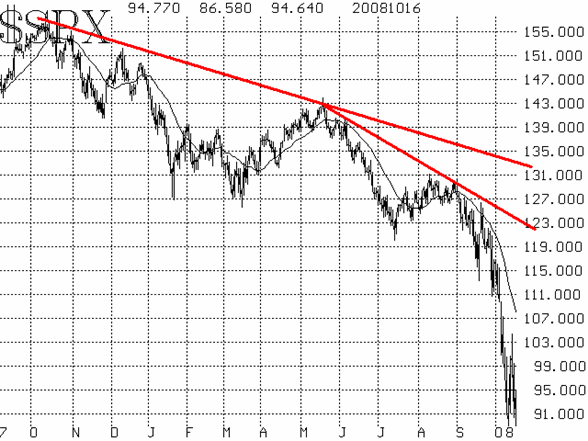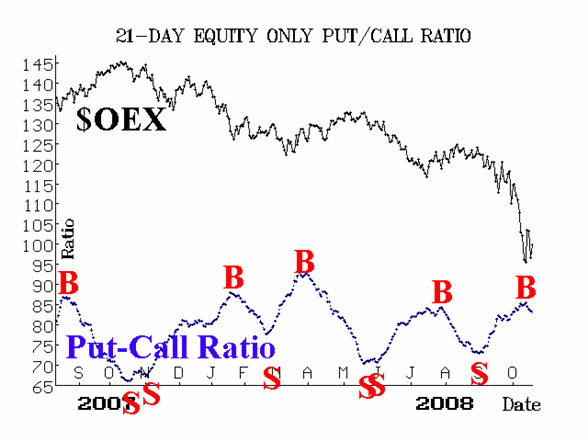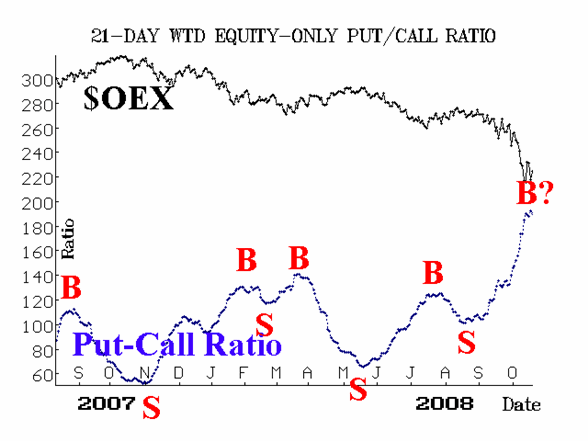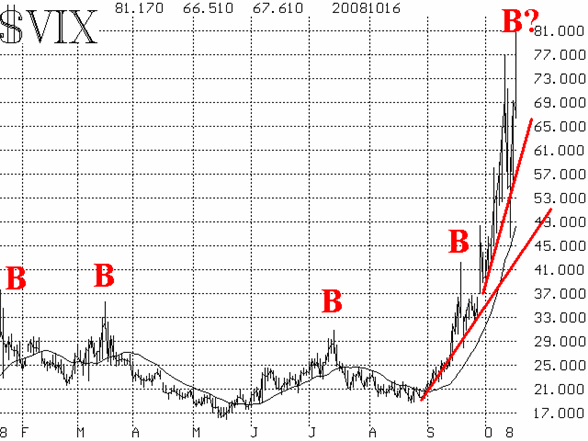| The McMillan Options Strategist Weekly |
| By Lawrence G. McMillan |
Published
10/17/2008
|
Options
|
Unrated
|
|
|
|
The McMillan Options Strategist Weekly
After another extremely volatile week, the technical picture has improved slightly, but not universally. The massive oversold condition continues to exist and has now been in place for at least two weeks -- longer, by some measures. There is no better place to start than with the chart of $SPX. Figure 1 continues to show $SPX in a severe downtrend, with the 20-day moving average (currently near 1080) also still declining. That is bearish until a pattern of higher highs and higher lows forms on the chart.
One thing that has been clear about this market is that it makes large moves -- moves which typically have taken days or weeks in the past -- in a matter of hours or days. From that perspective, it is possible that the pattern of higher highs and higher lows has begun to form. Last Friday's $SPX decline reached 840; the large rally early this week carried to 1040 (intraday, with a closing high at 1003); Thursday's decline fell to 865 and then a late rally ensued. Thus a "higher low" was put in place. If this rally continues, and closes above 1003 and/or trades above 1040, then technically a short-term series will have formed the requisite higher high, higher low pattern.

The equity-only put-call ratios are potentially nearing buy signals. The standard ratio has, in fact, generated a buy signal. The weighted ratio is another matter. Our computer analysis says that this, too, is a new buy signal, but one can plainly see that it looked that way a couple of days ago, too -- and wasn't. Still, the weighted ratio is very close to a buy signal, if not already on one.

Market breadth is a different matter. Nothing reflected the deeply oversold nature of this market any better than the devastation recorded in breadth. Breadth needs to continue to improve in order to generate buy signals from this indicator.

The volatility indices ($VIX and $VXO) registered all-time highs this week as well. $VXO topped out at 103 last Friday (when traders were buying index options in advance of the potentially volatile events of the upcoming weekend). $VIX, however, made its high just today -- at 81. These are both all-time highs. As our readers know, a spike peak in volatility indices is a short-term buy signal. Today's action alone constitutes a spike peak, as both indices finished 14 points below today's highs! However, a true intermediate-term buy signal doesn't occur until the trend of volatility changes. That trend is still upward (see Figure 4). $VIX would have to close below 55 to threaten the current steep uptrend.

In summary, the oversold conditions continue to exist. But oversold does not mean "buy." However, there are some true buy signals setting up as well: equity-only put-call ratios, spike peak in $VIX, potential higher high, higher low in $SPX. As a result, we feel that some bullish strategies can be attempted with the realization that any probe below $SPX lows at 840 would negate all bullish setups.
Lawrence G. McMillan is the author of two best selling books on options, including Options as a Strategic Investment, recognized as essential resources for any serious option trader's library.
|